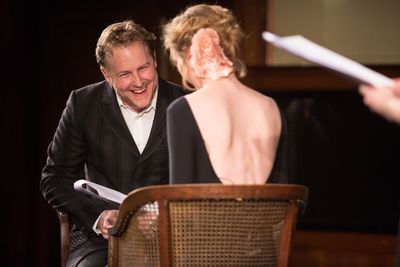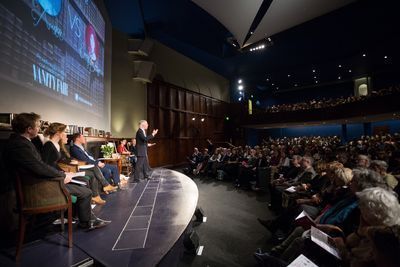Austen vs. Brontë
By ROZALIND DINEEN
The billing was Jane Austen vs. Emily Brontë: the Intelligence Squared Queens of English Literature debate. The auditorium was completely full. Professor John Mullan (UCL) spoke for Austen, novelist Kate Mosse was for Emily Brontë; actors Mariah Gale, Eleanor Tomlinson, Dominic West and Sam West played out the advocates’ favourite scenes. Polite and genteel it was not.
But neither – Mullan argued – was Austen. Some of her characters are ghastly, he said, and being with them is hell … but you cheer every time they walk into the room, don’t you? Mullan beguiled on Austen's behalf: she is so simple and yet so complicated, she is the writer who invented Free Indirect Speech and she didn’t even have clever siblings to help her (unlike her opponent). Mullan called this "miraculous".
Austen, we heard, is the greatest writer of dialogue and this Mullan proved by having Sam West and Eleanor Tomlinson portray Mr Elton and Emma (pictured below) in the carriage on Christmas Eve. The audience were rapturous and Kate Mosse, taking the stage to defend Emily Brontë, could not disagree with them.
Convincingly, Mosse conceded defeat before she had even begun, which was clever (even Austenian) of her. Her rousing endorsement of the underdog – little, undernourished Emily Brontë (her coffin only 17 inches wide) – began slowly, gently. It ended with Dominic West as an urgent, desperate Heathcliff, pleading with a beautiful Kathy (Mariah Gale). And then Sam West delivered the final lines of Wuthering Heights:
"I lingered round them, under that benign sky; watched the moths fluttering among the heath, and hare-bells; listened to the soft wind breathing through the grass; and wondered how any one could ever imagine unquiet slumbers for the sleepers in that quiet earth."
The world, said Mosse, is a lighter, better place because of Austen, but there must be more to life than marriage. Mosse continued by arguing that, unlike Austen, Brontë does not split men and women up into distinct camps, but looks at what they have in common and in doing so she changed what it was possible for women to write and for men to be.
The fight got just a little dirtier from here. We heard:
- But Austen had to end her books with marriage, because she wrote comedies.
- Mark Twain wanted to dig up Austen and beat her skull with a shin bone (Erica Wagner).
- He’s in denial!
- Brontë was the first punk.
- Brontë's like Tracey Emin.
- Austen, who was my wife’s great, great, great Aunt ... (that one, the audience).
Sam West proposed that you have to be in the right mood to read Austen, whereas Brontë sets the mood; that aside, he wouldn’t want to be in a world without either – which was a very charming and measured thing to say, but by this stage all heads in the audience were twitching to locate the voting boxes which were being passed around.
On the way in the audience polled at:
55% for Jane Austen
24% for Emily Brontë
21% undecided
After the debate, the vote lay at:
51% for Jane Austen
47% for Emily Brontë
2% undecided
So victory for Austen (and also for Mosse who persuaded the undecided to vote in her favour).
The debate continued as the crowd made its way out of the Royal Geographical Society and down to the tube.
- Brontë was so young when she wrote Wuthering Heights, Austen older and more sophisticated by the time she got to Persuasion.
-It’s true that foreigners don’t get Austen.
- No it’s not!
- Austen hates her characters, Brontë loves hers.
- How quick come the reasons for approving what we like! (That one’s Austen, who believed, I believe, in choosing sides).
For more Austen and Brontë in the TLS visit:
Jonathan Sachs on Jane Austen and her World
Michael Caines on How many great novels did Jane Austen write? And other notes from Austenland
Joe Phelan on Emily Brontë's poems
To hear the debate in full, visit Intelligence Squared in iTunes.

Peter Stothard's Blog
- Peter Stothard's profile
- 30 followers




